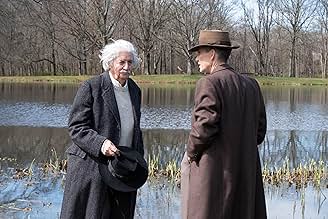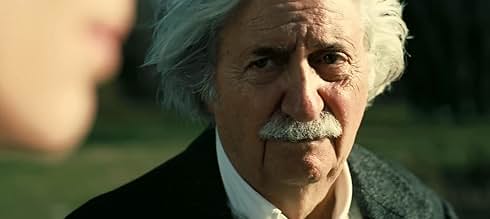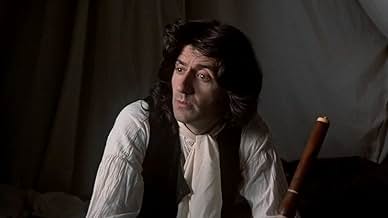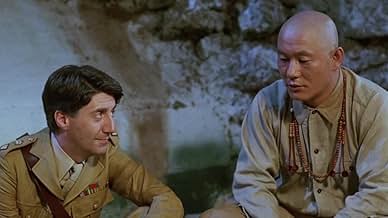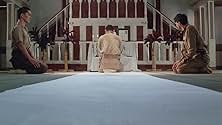Tom Conti(I)
- Actor
- Soundtrack
Preferring contemporary over classical theatre (with nary a Shakespeare stage credit in sight), one of West End theatre's most enduring and popular faces of the past four decades has been that of Tom Conti.
He was born Thomas Antonio Conti on November 22, 1941, in Paisley, Scotland, to a pair of hairdressers. His father, Alfonso, was an Italian immigrant, and his mother, Mary (McGoldrick), was Scottish, though of Irish descent. A student at Hamilton Park Catholic School (for boys), he initially trained for a musical career as a classical pianist but switched gears while attending the Royal Scottish Academy of Music and Drama. Conti's acting credits began with the Citizen's Theatre's 1959 production of "The Roving Boy" at age eighteen.
Throughout the 1960s he tried to make ends meet on the Glasgow and English repertory stages but gained little momentum despite some scattered TV appearances in between. Unable to find the break to sustain himself, he considered leaving the arts at one point for a steadier career in medicine. While performing in the 1972 play "The Black and White Minstrels" at the Traverse Theatre for the Edinburgh Festival, however, he was spotted and cast in the TV series Adam Smith (1972), thus beginning a more promising streak of work. He would return to the play in 1974 at the Hampstead Theatre, where he also performed in "Other People" (also 1974) and as the title role of "Don Juan" (1976). An earlier London stage debut in 1973 with the acclaimed Christopher Hampton play "Savages" also helped move things along.
Following a number of successful Engish mini-series roles, particularly his slothful Charles Bovary in Madame Bovary (1975), Jewish novelist Adam Morris in The Glittering Prizes (1976), and ever-conquesting Norman in "The Norman Conquest" trilogy by Alan Ayckbourn, Tom reaped huge career rewards under the theatre lights starring as a paralyzed sculptor in both the London and Broadway mountings of the right-to-die play "Whose Life is it Anyway?" in 1979. Among the reaps were the Tony, Outer Critics Circle, Laurence Olivier, and Variety Club Awards; among the rewards was a 1980s film career in starring roles. Despite losing out on recreating his "Whose Life..." role on film (Richard Dreyfuss was granted that opportunity in 1981), Tom absolutely wowed American audiences with his scene-stealing work in Merry Christmas Mr. Lawrence (1983) and Reuben, Reuben (1983). He was given the National Board of Review award for his participation in both films, and earned a "leading actor" Oscar nomination for the latter in which he played an alcoholic Scottish writer. To date, he has not received another Oscar nomination or, arguably, been handed comparative film roles since.
Continuing in American films with the lesser-received American Dreamer (1984) and Saving Grace (1986), he failed to nab what seemed quite inevitable -- Hollywood screen stardom. He did, however, venture off to find other film projects to star or co-star in over the years -- both here and abroad. These have included Shirley Valentine (1989) opposite Pauline Collins, Someone Else's America (1995), Out of Control (1998), Paid (2006), O Jerusalem (2006), A Closed Book (2009) with Daryl Hannah, a gender-bending version of The Tempest (2010) (as Gonzalo), City Slacker (2012), Paddington 2 (2017) and the sci-fi horror yarn Peripheral (2018).
Not one to frequent pubs himself, he nevertheless earned glowing reviews disappearing into the lives of two notorious celebrity tipplers -- columnist Jeffrey Bernard in "Jeffrey Bernard Is Unwell" (1990, 2000, 2006) and bon vivant actor John Barrymore in "One Helluva Life" (2002) -- in separate one-man stage shows. A writer as well, the versatile Conti published the thriller novel "The Doctor" in 2004. He has long been married to Scottish actress Kara Wilson (since 1967), who has appeared with him on stage ("Present Laughter" and "The Last of the Red Hot Lovers", both of which he also directed) as well as TV and film. Daughter Nina is an actress and ventriloquist. The couple maintain residence in London.
He was born Thomas Antonio Conti on November 22, 1941, in Paisley, Scotland, to a pair of hairdressers. His father, Alfonso, was an Italian immigrant, and his mother, Mary (McGoldrick), was Scottish, though of Irish descent. A student at Hamilton Park Catholic School (for boys), he initially trained for a musical career as a classical pianist but switched gears while attending the Royal Scottish Academy of Music and Drama. Conti's acting credits began with the Citizen's Theatre's 1959 production of "The Roving Boy" at age eighteen.
Throughout the 1960s he tried to make ends meet on the Glasgow and English repertory stages but gained little momentum despite some scattered TV appearances in between. Unable to find the break to sustain himself, he considered leaving the arts at one point for a steadier career in medicine. While performing in the 1972 play "The Black and White Minstrels" at the Traverse Theatre for the Edinburgh Festival, however, he was spotted and cast in the TV series Adam Smith (1972), thus beginning a more promising streak of work. He would return to the play in 1974 at the Hampstead Theatre, where he also performed in "Other People" (also 1974) and as the title role of "Don Juan" (1976). An earlier London stage debut in 1973 with the acclaimed Christopher Hampton play "Savages" also helped move things along.
Following a number of successful Engish mini-series roles, particularly his slothful Charles Bovary in Madame Bovary (1975), Jewish novelist Adam Morris in The Glittering Prizes (1976), and ever-conquesting Norman in "The Norman Conquest" trilogy by Alan Ayckbourn, Tom reaped huge career rewards under the theatre lights starring as a paralyzed sculptor in both the London and Broadway mountings of the right-to-die play "Whose Life is it Anyway?" in 1979. Among the reaps were the Tony, Outer Critics Circle, Laurence Olivier, and Variety Club Awards; among the rewards was a 1980s film career in starring roles. Despite losing out on recreating his "Whose Life..." role on film (Richard Dreyfuss was granted that opportunity in 1981), Tom absolutely wowed American audiences with his scene-stealing work in Merry Christmas Mr. Lawrence (1983) and Reuben, Reuben (1983). He was given the National Board of Review award for his participation in both films, and earned a "leading actor" Oscar nomination for the latter in which he played an alcoholic Scottish writer. To date, he has not received another Oscar nomination or, arguably, been handed comparative film roles since.
Continuing in American films with the lesser-received American Dreamer (1984) and Saving Grace (1986), he failed to nab what seemed quite inevitable -- Hollywood screen stardom. He did, however, venture off to find other film projects to star or co-star in over the years -- both here and abroad. These have included Shirley Valentine (1989) opposite Pauline Collins, Someone Else's America (1995), Out of Control (1998), Paid (2006), O Jerusalem (2006), A Closed Book (2009) with Daryl Hannah, a gender-bending version of The Tempest (2010) (as Gonzalo), City Slacker (2012), Paddington 2 (2017) and the sci-fi horror yarn Peripheral (2018).
Not one to frequent pubs himself, he nevertheless earned glowing reviews disappearing into the lives of two notorious celebrity tipplers -- columnist Jeffrey Bernard in "Jeffrey Bernard Is Unwell" (1990, 2000, 2006) and bon vivant actor John Barrymore in "One Helluva Life" (2002) -- in separate one-man stage shows. A writer as well, the versatile Conti published the thriller novel "The Doctor" in 2004. He has long been married to Scottish actress Kara Wilson (since 1967), who has appeared with him on stage ("Present Laughter" and "The Last of the Red Hot Lovers", both of which he also directed) as well as TV and film. Daughter Nina is an actress and ventriloquist. The couple maintain residence in London.


